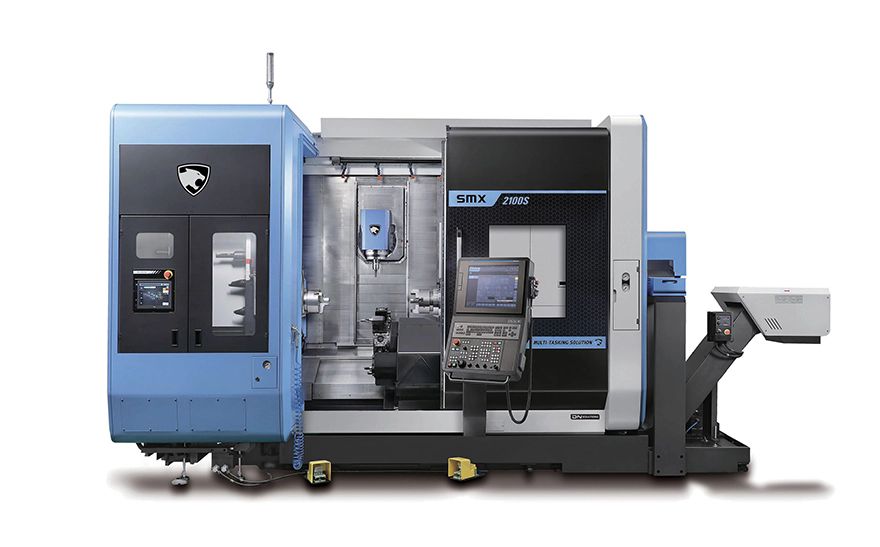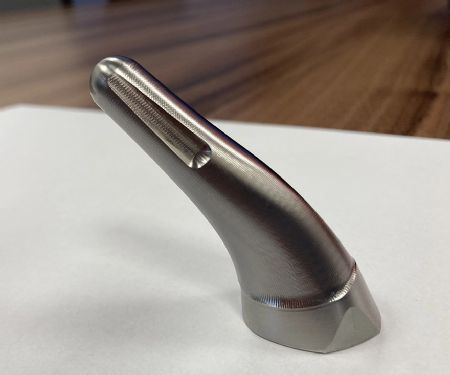 SMX2100S
SMX2100SLeamington Spa-based
Mills CNC, the exclusive distributor of DN Solution’s and Zayer machine tools in the UK and Ireland, has announced that it will be undertaking a medical implant machining demonstration on a DN Solutions’ SMX 2100SB advanced multi-tasking mill-turn machine — a large bore, multi-tasking mill-turn machine — at
Seco Tools’ ‘Aerospace & Medical’ Inspiration through Innovation event taking place at the company’s facility in Alcester, 16-17 October.
The Fanuc-controlled machine, equipped with two, left and right, opposing 22kW/5,000rev/min spindles, a 12,000rev/min B-axis milling head, a 40-tool position ATC, a 12/24-position turret with driven tooling capabilities (5,000rev/min) and integrated thermal compensation, is an advanced, high-performance and proven multi-tasking machine designed for complex, high-precision ‘one-hit’ part processing.
The SMX 2100SB was selected by Mills CNC to appear at Seco’s
Inspiration through Innovation event to demonstrate the machine’s inherent flexibility and the significant productivity and process efficiency gains it provides to component manufacturers machining complex, high-precision medical parts.
Following its selection, pre-sales engineers from Mills CNC, working closely with partners from Seco Tools (cutting tools),
Hainbuch (work-holding) and
Open Mind (CAD-CAM software), began to design and develop a secure, reliable and repeatable process to machine a small, high-precision medical implant part that would be machined, in small volumes, over the two-day event.
The part selected for the live machining demonstration is a shoulder implant — the stem-like component that goes into the humerus bone (upper arm). This implant is attached to another implant part, the humeral head, a ball-like structure at the top of the humerus which, during surgery, fits into the glenoid cavity (or socket) located in the scapula (shoulder blade).
The stem component being machined on the SMX 2100SB is made from a solid titanium bar/billet with individual part dimensions being approximately 74mm in length and 50mm diameter. Total part cycle time is 45min, and this includes all front- and back-end machining operations including parting-off and part transfer between the left and right spindles.
 Pictured right: the part selected for the live machining demonstration at the Seco event is a shoulder implant — the stem-like component that goes into the humerus bone (upper arm)
Pictured right: the part selected for the live machining demonstration at the Seco event is a shoulder implant — the stem-like component that goes into the humerus bone (upper arm)In addition to parting-off, other operations include roughing and finishing (front and back-end), OD profiling, slotting, face and side milling, three-axis turning, five-axis simultaneous milling, drilling and counter sinking.
For the Seco event, a number of 600mm length titanium bars will be available which, using a bar puller, will enable continuous production. In addition to a Hainbuch collet chuck being used on the left spindle, and Open Mind (HyperMill) CAD-CAM software being used throughout, a range of Seco end mills, button and ball nose cutters are used for all roughing, semi-finishing and finishing operations.
The shoulder implant is one of a number of machining processes for medical components that Mills CNC, Seco Tools, Hainbuch and Open Mind have developed over recent months: these include machining a hip cup on a Lynx 2600SY (sub-spindle, Y-axis) lathe and a femoral (knee joint) implant on a DVF 5000 five-axis machining centre.
Tony Dale, Mills CNC’s CEO, said: “The shoulder implant machining demonstration underlines and endorses the flexibility, rigidity, speed and accuracy of the SMX 2100SB machine series. At the last
Inspiration through Innovation event for example, a similar sized SMX mill-turn machine was showcased machining an aerospace impeller made from EN 8 carbon steel billet. The machining process developed for the shoulder implant is scalable and, using bar-feeders and the SMX’s parts catcher, can be automated to facilitate continuous, lights-out manufacture.”